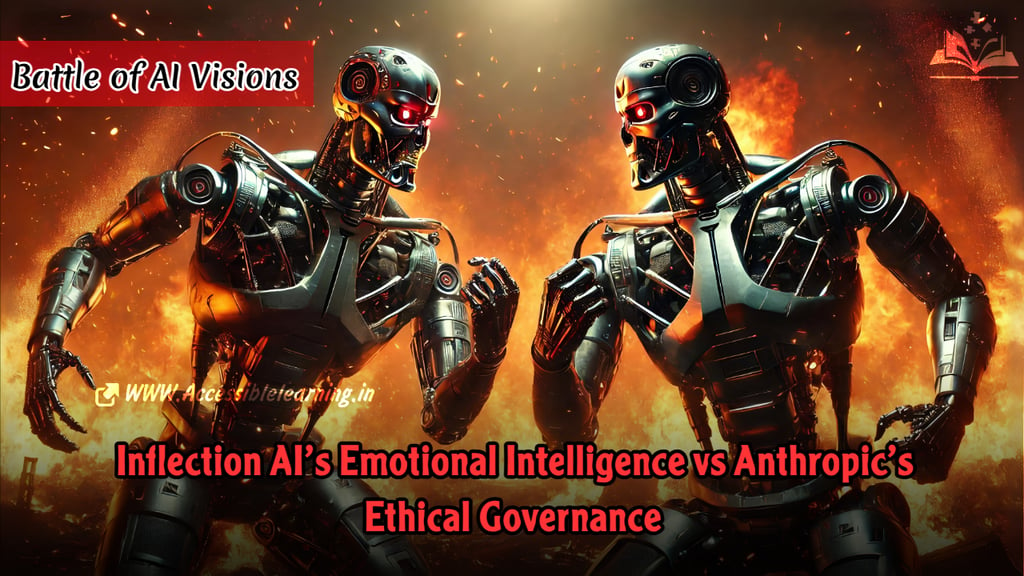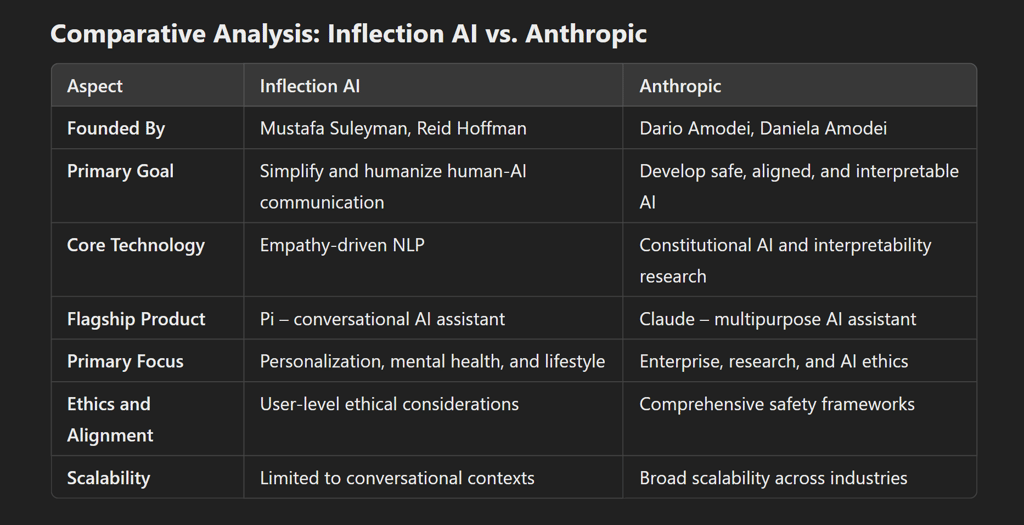
Inflection AI vs Anthropic: How They’re Redefining AI’s Role in Society?
Explore the in-depth comparison of Inflection AI and Anthropic, two trailblazers in the AI industry. Learn about their unique approaches, innovative technologies, ethical challenges, and their vision for the future of artificial intelligence.
AI ASSISTANTCOMPANY/INDUSTRYAI/FUTUREEDUCATION/KNOWLEDGEEDITOR/TOOLS
Sachin K Chaurasiya
1/11/20257 min read


Artificial intelligence (AI) has become a driving force behind technological innovation, shaping industries, societies, and even personal interactions. Two notable players in this arena, Inflection AI and Anthropic, have emerged with distinct philosophies and approaches to AI development. While Inflection AI is centered on enhancing human-AI conversations, Anthropic focuses on creating safe, interpretable, and aligned AI systems. This article explores their missions, technologies, strengths, and future prospects, offering an in-depth comparison to help you understand their impact on the AI ecosystem.
Inflection AI: Pioneering Conversational AI
Mission & Vision
Founded in 2022 by Mustafa Suleyman (co-founder of DeepMind) and Reid Hoffman (LinkedIn co-founder), Inflection AI aims to simplify human-computer interactions. Their vision is to create AI systems that communicate as naturally and intuitively as humans, with an emphasis on understanding, empathy, and meaningful engagement.
Flagship Product: Pi
Inflection AI's main offering, Pi, is a conversational AI assistant designed to be emotionally intelligent and user-friendly. Unlike traditional chatbots, Pi focuses on fostering trust and well-being, making it ideal for personal use, including mental health support, life advice, and general assistance.
Core Technologies
Natural Language Processing (NLP): Pi leverages advanced NLP techniques to understand nuanced human communication, ensuring accurate and contextually appropriate responses.
Empathy-Driven AI: The system is fine-tuned to recognize emotions, respond empathetically, and create a positive user experience.
Personalization: Pi adapts to individual users over time, learning their preferences, communication styles, and needs.
Target Audience
Inflection AI primarily caters to individual users, focusing on scenarios like:
Mental health support: Providing a safe space for users to express themselves.
Customer service enhancement: Offering empathetic, real-time responses to customer inquiries.
Lifestyle management: Assisting with personal organization, reminders, and general queries.
Strengths
Empathetic Design: Prioritizes user emotions and well-being, offering a personalized and humanized AI experience.
Intuitive Conversations: Excels in creating natural, engaging interactions that mimic human communication.
Specific Focus: Targets mental health and personal assistance, making it ideal for consumers.
Limitations
Limited Scope: The narrow focus on conversational AI restricts its use in broader domains like enterprise or technical research.
Scalability Issues: Expanding beyond conversational AI could dilute its core strengths and brand identity.
Market Opportunities
Mental Health Applications: Expanding partnerships with healthcare providers to integrate Pi into therapy and counseling services.
Customer Support: Leveraging Pi for industries like e-commerce and hospitality to offer empathetic customer service.
Inflection AI: Human-AI Relationships at the Core!
Advanced Contextual Understanding
Inflection AI is pushing the boundaries of how conversational agents perceive and respond to layered human emotions and complex contexts. Unlike traditional chatbots, their models aim to infer subtle signals from tone, choice of words, and even pauses in text conversations to provide more meaningful and tailored responses.
Privacy-Focused Interaction
Inflection AI emphasizes user data security by building models that minimize reliance on extensive data collection. By employing federated learning and encrypted processing, Pi users can trust that their interactions remain confidential.
Collaborations with Experts
The company has teamed up with behavioral scientists and linguists to refine its conversational capabilities, ensuring that its product is not just technically advanced but also culturally sensitive.
Potential Integration Areas
Beyond mental health and customer service, Inflection AI is exploring applications in education, such as tutoring systems for language learning and assistive technology for differently-abled individuals to help them navigate digital interfaces more effectively.
Technical Challenges
Emotion Recognition Accuracy: As Pi becomes more widespread, ensuring consistent accuracy in emotional recognition across diverse demographics and languages is a challenge. Cultural nuances in communication pose significant hurdles in global deployment.
Balancing Empathy and Utility: While emotional intelligence is its hallmark, there is a fine line between empathetic conversations and delivering functional utility, especially in time-sensitive scenarios.
Implications for the AI Industry
Mainstreaming Conversational AI: By creating accessible and emotionally aware AI, Inflection AI is shaping public perception of AI as a helpful and empathetic partner in daily life.
Catalyzing Market Competition: Competitors like Google Bard and ChatGPT are likely to take cues from Inflection AI’s user-centric design, sparking innovation in conversational AI products.
Unique Use Cases and Applications
Corporate Wellness Programs: Large organizations could adopt Pi as a wellness companion for employees, helping reduce stress and improve work-life balance.
Personalized Education Platforms: Pi can serve as a conversational tutor for students, offering customized learning experiences.


Anthropic: Advocating for Ethical AI!
Mission & Vision
Anthropic, founded in 2021 by Dario Amodei and his team of former OpenAI researchers, was created to address existential risks associated with advanced AI systems. The company’s goal is to ensure AI models are safe, reliable, and aligned with human values, particularly as they grow increasingly powerful.
Flagship Product: Claude
Anthropic’s AI assistant, Claude, is named after Claude Shannon, the father of information theory. It is a versatile AI model designed to handle a variety of applications, from enterprise solutions to research tasks, with a focus on safety and interpretability.
Core Technologies
Constitutional AI: A unique framework where AI models follow a "constitution" of ethical principles during training, ensuring that outputs align with human values.
Interpretability Research: Anthropic prioritizes transparency, developing tools to understand how AI models make decisions.
Scalable Alignment: The company focuses on aligning increasingly complex AI systems with human intent, even in high-stakes environments.
Target Audience
Anthropic caters to organizations and researchers requiring:
Enterprise solutions: Safe and reliable AI for automation, decision-making, and data analysis.
Research support: Tools to aid scientific discovery and innovation.
AI governance: Models that prioritize ethical considerations and accountability.
Strengths
Ethical Frameworks: Constitutional AI ensures safe, reliable, and aligned outputs, especially in critical applications.
Research-Oriented: Deep investment in interpretability makes it a leader in AI transparency.
Versatility: Designed for diverse applications, from corporate solutions to ethical AI governance.
Limitations
Complex Development: A focus on safety and interpretability may slow down deployment compared to competitors.
Accessibility Challenges: Lacks the consumer-friendly touch of Inflection AI, focusing more on organizational use cases.
Market Opportunities
Enterprise Solutions: Targeting high-stakes industries like finance, healthcare, and defense with safe, reliable AI tools.
Policy and Governance: Collaborating with governments and institutions to establish ethical AI frameworks globally.
Anthropic: Guarding AI's Moral Compass!
Dynamic Risk Assessment
Anthropic’s approach to alignment isn’t static. The company constantly evolves its ethical frameworks and "constitutions" to adapt to changing societal values and expectations. This dynamic strategy ensures that its AI systems remain relevant and morally aligned as societal norms shift.
AI Auditing Tools
One of Anthropic’s lesser-known but critical contributions is the development of auditing tools for organizations deploying AI. These tools help companies identify potential risks, biases, and alignment issues within their AI systems before deployment.
Long-Term Focus
Anthropic is unique in its approach to long-term AI safety, especially in the realm of superintelligence risks. By focusing on hypothetical but highly impactful future scenarios, the company is preemptively building frameworks to prevent existential risks that could emerge from unaligned advanced AI systems.
Collaboration with Governments
Anthropic has been actively engaging with policymakers to influence AI legislation, particularly around accountability, transparency, and the ethical implications of large-scale AI deployments.
Technical Challenges
Scaling Constitutional AI: Developing and scaling "Constitutional AI" frameworks across increasingly complex models is resource-intensive. Ensuring that such systems adapt without introducing unintended constraints is a persistent challenge.
Interpretability Complexity: As AI models become larger and more intricate, making their decision-making processes understandable for non-technical stakeholders remains a daunting task.
Implications for the AI Industry
Regulatory Standards: Anthropic’s work on ethical alignment could form the blueprint for future regulatory standards in AI safety, influencing legislation worldwide.
Corporate Responsibility Models: By focusing on AI governance, Anthropic is setting an example for other companies to prioritize safety, even at the cost of slower product rollouts.
Unique Use Cases and Applications
Critical Infrastructure: Claude could play a pivotal role in managing and monitoring AI systems used in critical infrastructure, such as energy grids or healthcare databases.
AI Policy Development Tools: Anthropic could provide its research tools to governments, enabling them to test AI safety policies before enforcing them.


Cultural Philosophies & Leadership Styles!
Inflection AI’s Agile Innovation Culture
Leadership’s Visionary Drive: Mustafa Suleyman brings a deep understanding of scaling AI innovations from his DeepMind days, while Reid Hoffman’s entrepreneurial expertise fosters a culture of rapid prototyping and adaptability.
Employee Empowerment: Inflection AI’s team operates in small, cross-functional units to ensure swift decision-making and creativity in tackling challenges.
Community Engagement: The company actively involves end-users in testing and refining Pi, creating a feedback loop that prioritizes real-world usability over theoretical perfection.
Anthropic’s Research-First Ethos
Safety-Driven Approach: Unlike Inflection AI’s consumer-first strategy, Anthropic prioritizes slow, deliberate advancements, ensuring every new feature or update aligns with rigorous ethical benchmarks.
Academic Collaboration: The company has partnered with leading universities and independent research labs, focusing on publishing interpretability papers and sharing safety methodologies.
Focus on Transparency: Internally, Anthropic maintains an open culture where researchers are encouraged to challenge assumptions and explore alternative safety mechanisms.
Key Challenges for Both Companies in 2025?
Global Competition: Both companies face growing competition from players like OpenAI, DeepMind, and Microsoft. Standing out in a saturated market requires constant innovation and differentiation.
Ethical Debates: As AI becomes more embedded in society, both Inflection AI and Anthropic AI will face scrutiny over unintended consequences, such as biases or misuse of their systems.
Resource Constraints: While Inflection AI is consumer-focused, expanding beyond conversational AI will require significant investments. Anthropic, with its research-heavy focus, must balance long-term safety goals with immediate commercial viability.
Looking Ahead: Shared Challenges & Collaborative Potential
Though their approaches differ, Inflection AI and Anthropic share a common goal: creating AI systems that serve humanity responsibly. Future collaboration could address some of their challenges:
Ethical Conversational Agents: Combining Inflection AI’s empathy-driven AI with Anthropic’s safety frameworks could result in a groundbreaking assistant for both personal and professional use.
Global AI Standards: Joint efforts in AI safety research and policy could lead to universal standards for ethical AI development.
Inflection AI and Anthropic represent two complementary visions of artificial intelligence. Inflection AI emphasizes empathy, accessibility, and user experience, while Anthropic prioritizes safety, alignment, and ethical governance. Their paths might differ, but both are crucial in shaping a future where AI remains a force for good, addressing not just individual needs but societal challenges.
Subscribe To Our Newsletter
All © Copyright reserved by Accessible-Learning Hub
| Terms & Conditions
Knowledge is power. Learn with Us. 📚


